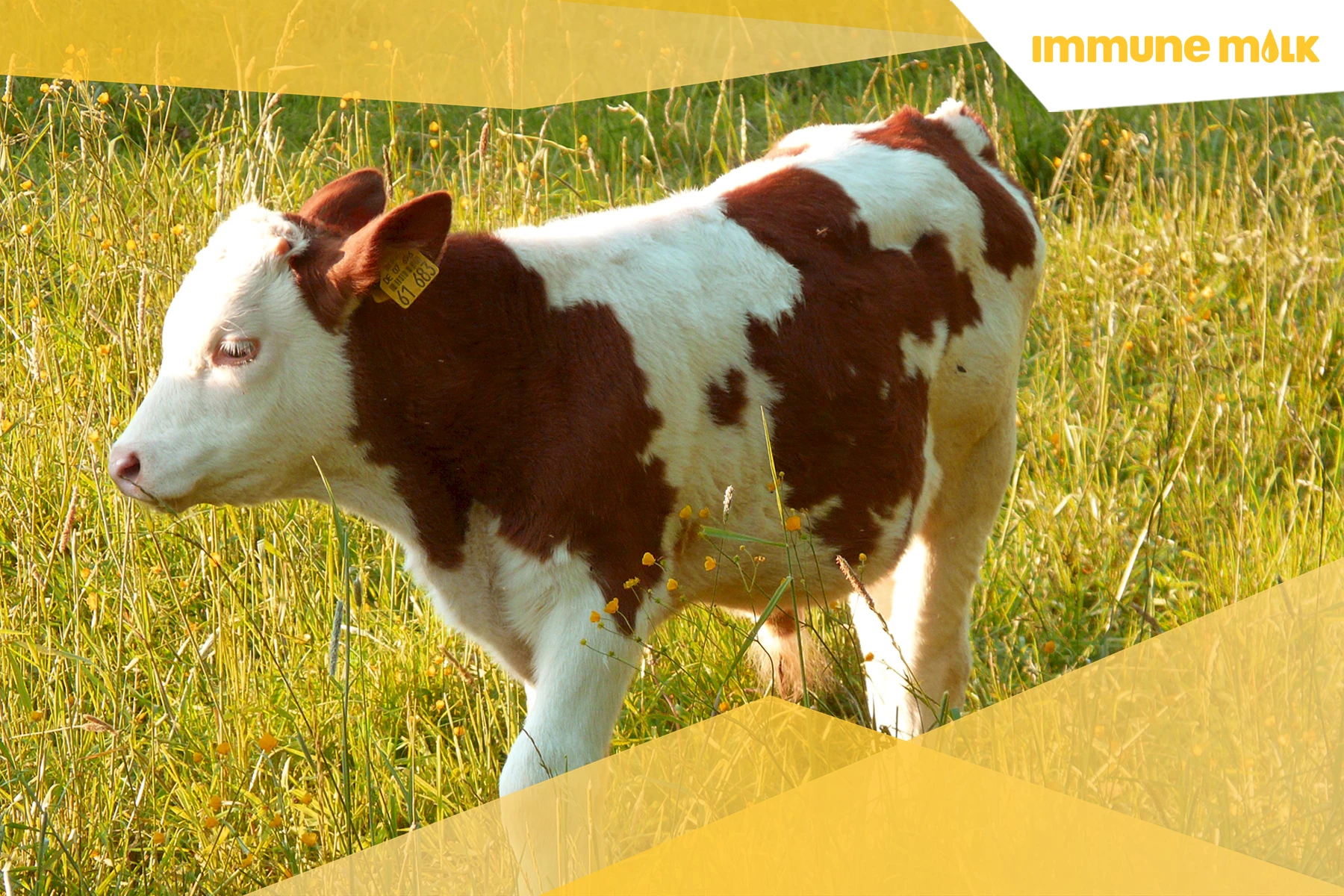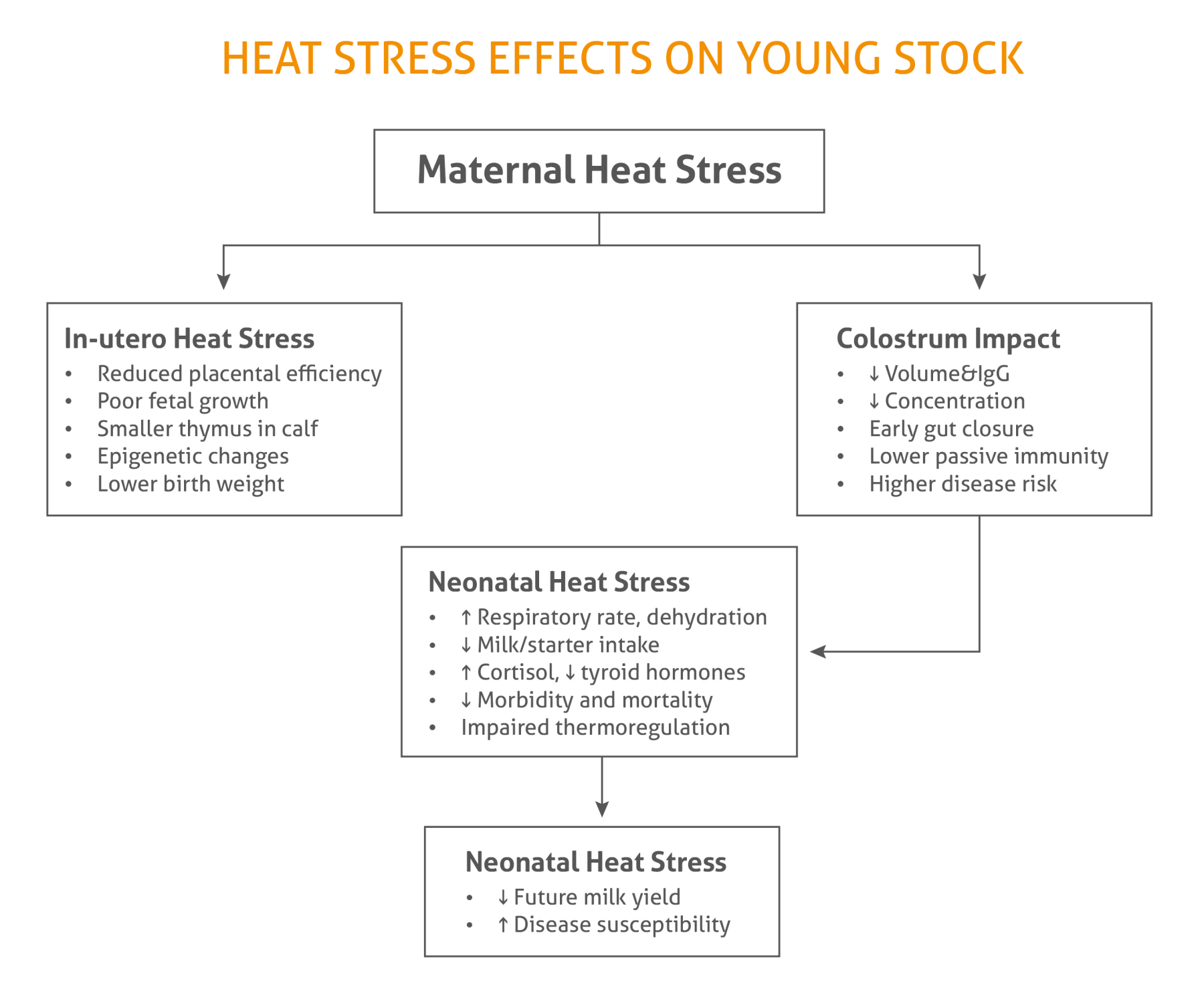
El estrés por calor ocurre cuando la carga de calor interna del animal excede su capacidad para disipar ese calor en el medio ambiente. En razas lecheras como Holstein, este desequilibrio se intensifica por su área limitada de superficie de piel, pelaje grueso y baja actividad de las glándulas sudoríparas.
En animales jóvenes, el impacto es aún más severo:
Los terneros con menos de 30 días comienzan a sufrir fisiológicamente a temperaturas ambiente superiores a 25 ° C.
Presentan frecuencias respiratorias elevadas, deshidratación, disminución de la ingesta de leche y letargo.
A diferencia del ganado adulto, los terneros generan menos calor interno al rumiar, pero también son menos eficientes en el manejo de la temperatura corporal debido a los sistemas de termorregulación inmaduros.
El calostro es más que la primera leche: es el sistema de defensa inmunológica inicial de un recién nacido. Desafortunadamente, el estrés por calor durante la última etapa de la gestación en las vacas reduce significativamente tanto el volumen como la calidad del calostro. Los estudios han demostrado que:
El estrés por calor no espera al nacimiento para dejar su huella. Los terneros expuestos al estrés por calor en el útero, especialmente durante el último trimestre, muestran deficiencias de desarrollo a largo plazo:
Si bien es casi imposible prevenir completamente las olas de calor, las intervenciones estratégicas pueden mitigar el daño:

Incluso con los mejores esfuerzos, existen límites a lo que puede lograr la gestión convencional. Aquí es donde entran en juego los suplementos avanzados de calostro y los aditivos funcionales de origen vegetal.
Las últimas investigaciones destacan la importancia de un apoyo nutricional específico para los terneros recién nacidos, especialmente aquellos afectados por estrés térmico intrauterino (IUHS). Estos terneros suelen presentar una absorción deficiente de inmunoglobulinas, un aumento de la permeabilidad intestinal y un estrés oxidativo elevado. Mejorar la transferencia de inmunidad pasiva y mantener la integridad intestinal son factores fundamentales para mejorar la supervivencia y la productividad a largo plazo.
Los recientes avances en el procesamiento del calostro permiten ahora obtener suplementos ricos en inmunoglobulinas y libres de anticuerpos específicos como el IBR, diseñados para una biodisponibilidad óptima incluso en condiciones de absorción comprometidas. Del mismo modo, ciertos aditivos alimentarios de origen vegetal han demostrado su capacidad para:
El estrés por calor en el ganado joven es un problema crítico que afecta no solo la salud inmediata de los terneros, sino también la productividad a largo plazo y la competencia inmunológica. Las temperaturas ambientales elevadas afectan la capacidad de la madre para producir calostro de alta calidad y reducen la transferencia pasiva de inmunidad al ternero recién nacido. Además, los terneros expuestos al calor en el útero o después del nacimiento experimentan un mayor estrés fisiológico, inmunidad comprometida, crecimiento reducido y una mayor susceptibilidad a las enfermedades.
Dado que el cambio climático hace que los episodios de estrés por calor sean más frecuentes y prolongados, comprender estos impactos e implementar estrategias preventivas se ha convertido en un aspecto esencial de la gestión ganadera moderna. La integración entre el manejo ambiental, la nutrición de precisión y las soluciones naturales representa la vía más prometedora para proteger a los animales jóvenes y garantizar sistemas productivos más resilientes y sostenibles.

El Dr. Oguz Calisici estudió medicina veterinaria en Alemania y Turquía. Después de completar su tesis doctoral en la Universidad de Hannover, continuó trabajando en la universidad en las áreas de biotecnología y inseminación artificial. Después de trabajar como veterinario práctico en Alemania, Oguz fue director general de una gran empresa láctea en Turquía. En Phytobiotics, Oguz se hizo cargo de la gestión de productos de Immune Milk.
Póngase en contacto con nuestros expertos o envíenos un mensaje. Nos pondremos en contacto con usted lo antes posible.